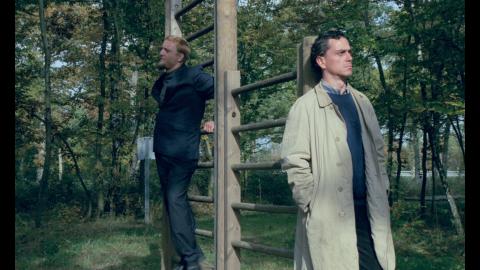Knowing the End Before the Beginning: THE VANISHING

THE VANISHING
This essay on director George Sluizer's The Vanishing (1988) was written by Kristen Johnson-Salazar, a senior in the Communication Arts Department at UW Madison. The Vanishing will screen on Friday, November 30 at 7 p.m. in our regular venue, 4070 Vilas Hall. Free admission!
By Kristen Johnson-Salazar
In the early 2000s, the cable channel Bravo aired a documentary series titled The 100 Scariest Movie Moments, which featured famous horror directors and actors discussing creepy or terrifying scenes from movies ranging from established American horror films to international art cinema. I was in my early adolescence when my sisters and I watched it for the first time. We were in the basement watching the talking heads on screen describe each scene in detail and how they felt while seeing it for the first time. The Vanishing was listed in the middle at number 55. Similar to Psycho (number 4 on the Bravo list), once you see The Vanishing, there is no unseeing or un-remembering. It will never be new to you again. So, when Bravo showed the ending to the film, I was left in shock and disgust. I was horrified both of what I just saw and that the ending was spoiled for me. However, I knew The Vanishing was more than just that one scene. When I finally got around to watch it years later, I was astounded that the whole movie was unsettling, echoing real life kidnappings and true crime stories. The ending, while brilliant, was just the cherry on top.
The Vanishing is a dual story. Part of the story is about Rex (Gene Bervoets) strenuously searching for his missing girlfriend Saskia (Johanna ter Steege). The other story is about Raymond (Bernard-Pierre Donnadieu), the man who kidnapped Saskia. The two stories connect with each other as Rex’s obsession with finding the abductor intertwines with Raymond’s temptation of Rex to see how far he is willing to go with his search.
Interestingly enough, George Sluizer directed two films titled The Vanishing. Five years after the first film released, it was remade with an American cast featuring Jeff Bridges, Kiefer Sutherland, and Sandra Bullock. It joins the pantheon of remakes that are directed by the same director of the original such as Michael Haneke’s Funny Games, Takashi Shimizu’s The Grudge, and Alfred Hitchcock’s The Man Who Knew Too Much. However, much of the suspense is lost in translation—especially the ending, which was changed from the original. Fortunately, the original 1988 version still exists. Perhaps the best thing about the 1993 remake is that it amplifies why the ’88 version works so well.
The slow and gritting agony of wanting to know where Saskia is, speaks to the film’s influences in realism. While watching, you start to notice that because of how unassuming Raymond is, he instantly becomes more of a threat. We’ve seen his dips into sociopathy before, from real life serial killers like Ted Bundy. For instance, he uses an arm cast to gain sympathy from his victims, showing how unnervingly close he is to our reality. He methodically writes down how long each action takes in order for him to kidnap someone without anyone noticing. Then he practices each action over and over again until it becomes second nature. He does this all the while he is a husband and a father of two girls. Our hero, Rex, also parallels many who have lost loved ones who have gone missing. Whether that be putting up missing signs, appearing on the news, or answering any tips he receives, he never gives up hope in trying to find Saskia. This is why this film is so uncomfortable. We have seen this story thousands of times in real life. Yet, now we are given the duality of seeing how both perspectives, the kidnapper and the victim, go on after the initial event. Unlike real life, we see the dramatic irony of who the kidnapper is, but like Rex, we just don’t know what or even why it happened.
The film gathers these moments to form an overwhelming ache for the truth. The real horror The Vanishing pushes us into is to understand our own fascination with these stories of true crime. Instead of just wanting the villain to get caught in the end, we want to know the secrets that lie within their head. We want to know: Why? Otherwise, we are left with uncertainty. The eternal uncertainty, that is the worst.
